An Interview with RKC and PCC Instructor, Matt Begansky
by Adrienne Harvey PCC-TL, RKC-II, CK-FMS, Primal Move Nat'l Instructor
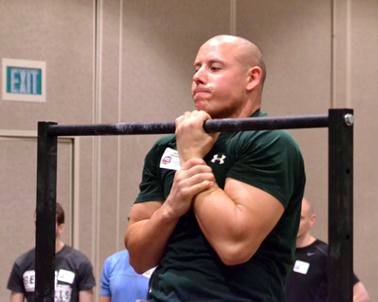
Dragon Door: How did you get started with fitness and strength training?
Matt Begansky: I’ve lifted weights for almost my whole life. I was heavily influenced by my dad—an avid weightlifter. I can remember watching him pump iron when I was a kid. My love of weightlifting really developed at a young age because I thought it was cool that my dad was strong and fit. He looked the part more than some of the other dads.
As I grew older, I learned that weight training was very important when playing sports like football. I loved to deadlift, squat, and bench press. And all of that was really geared towards football.
In 2005, after playing football for all four years of college, I graduated—and weighed about 295lbs. I knew that once I stopped playing football, I wanted to drop weight and gear my training towards my own personal goals instead of adhering to a sports-oriented training schedule.
Dragon Door: On your bio, you mention a weight loss of about 90lbs!
Matt Begansky: Yes, I'm now down roughly 90-92lbs. In 2005 I wore 46" waist jeans and now I wear a 33/34". Many things have drastically changed for me!
Dragon Door: How did you lose over 90lbs?
Matt Begansky: I initially started with interval training and continued my traditional weight training program. My roommate and I would get up early, go to the YMCA, and push each other in the gym. We also held each other accountable with our eating. It was really the first time in my life that I started to eat well.
Other than losing weight, I really didn't have a specific goal. I definitely started eating better than when I was in college. When I minimized drinking and incorporated more exercise into the day, the pounds started rolling off.
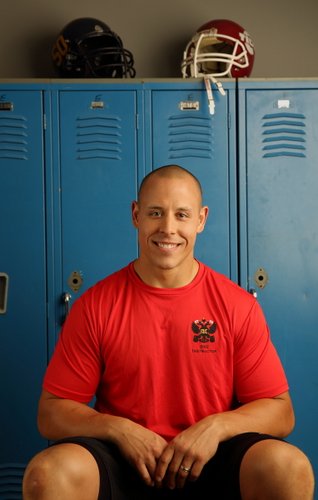 Dragon Door:
Dragon Door: What did you study in college?
Matt Begansky: I have a degree in secondary education with an emphasis in history. After graduating, I spent a lot of time substitute teaching, then coached high school football and junior high track. I helped both teams develop fitness programs. Those experiences were really the first time that I actually coached. At that time, I was located in Pennsylvania and didn't really know that a career in personal training existed. Now I’m in the DC metro area where
personal training is a thriving profession.
Dragon Door: Does your background in education/coaching help you as a personal trainer?
Matt Begansky: Absolutely. It definitely takes a special kind of person to break down the
kettlebell swing with the necessary patience, knowledge, and visual attention. My teaching background has definitely played a pivotal role in helping me teach clients with different weaknesses how to correctly execute movements in the gym.
Dragon Door: When did you get your RKC Certification?
Matt Begansky: I achieved the title of RKC in 2013, but originally found kettlebells in 2008. Early on, I mainly stuck with basic movements like swings, goblet squats, and presses. After doing some research, I found Senior RKC and local kettlebell guru,
Mike Krivka. He really helped me with my fitness training and helped me brush up on my technique. I also read
Enter the Kettlebell about five times and really committed myself to the training.
Dragon Door: Do you have your own gym or studio?
Matt Begansky: I own and operate The House of Fitness personal training studio in Silver Spring, Maryland. My clients are of all ages and we really focus on personal training at its best—entire wellness. In addition to training, we talk about mental strength and how food is such an influence on our lives. Of course my main tool is the kettlebell, and we also do all kinds of
bodyweight training. I’ve learned and adopted a lot of the PCC into my training world.
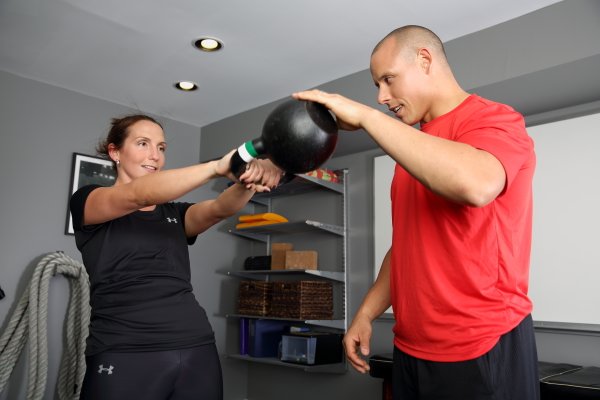
I mainly work with weight loss populations—it’s sort of my niche. I help obese people who are struggling and who tried things like Weight Watchers and Curves, but who’ve never really had weight training in their lives. I also help them learn how to acquire the skill of healthy eating.
In addition, I work with several older clients, and have many people come to the studio who’ve never worked out before. I love these people. I work with their strengths, and the next thing we know they're swinging a kettlebell!
I’ve recently started working with younger kids. They are like sponges and adapt to the kettlebell so well. They love working with kettlebells because it’s something new that they’ve never seen before. With the kettlebell, even after failing a few times, they know that they can and will swing it.
I pride myself on making The House of Fitness an intimate, family environment where people can be themselves without the distractions found in large-scale commercial gyms. I’ve chosen the tools of my trade—kettlebells, medicine balls,
pull-up bars, TRX, and battling ropes—because I firmly believe these tools work. I feel that weight loss is a very intimate thing, and the small, personal environment that I offer allows people to accomplish their goals and still be themselves.
It’s hard to find a commercial gym with kettlebells—and that’s really a sticking point with me because I thoroughly believe in the kettlebell and the effects it has on the body.
Dragon Door: What’s your advice for instructors or trainers who are interested in working within the fat loss demographic?
Matt Begansky: Having a sense of humor goes a long way, I believe that you have to be able to laugh at yourself as a trainer and not take yourself too seriously. And you also have to know and be able to communicate that perseverance pays dividends in life. Definitely learn to teach others how to get out of their comfort zones.
Dragon Door: How are you helping the people who've never worked out before?
Matt Begansky: One of the things I really like from the
PCC is the idea that exercise is a really basic thing. Initially, I teach everyone to squat, which helps them acknowledge that they can really do something. I also love using humor to break the tension so that we keep our training in a very low stress environment. I feel like people do really well in fitness situations without any kind of pressure.
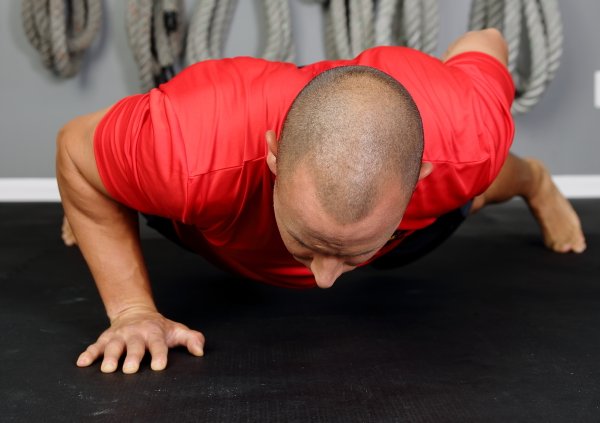
Dragon Door: What’s your favorite kettlebell move?
Matt Begansky: Definitely the Turkish get-up. I believe it pays the greatest dividends, and is a great rehab tool. I love to break it up into smaller parts like the get-up sit up, lunge, press, and carries. For being such a basic movement, it develops great strength and muscular stability.
Dragon Door: Is that also exercise you most enjoy coaching?
Matt Begansky: I really do love coaching the get-up because it's sort of a black sheep. Most people have never been exposed to such a movement, and it can be adapted to all fitness levels—from only giving someone manual resistance to having them hold a kettlebell overhead while they flow through all the different stages of the get-up.
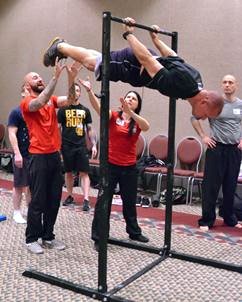 Dragon Door:
Dragon Door: How did you decide to attend the PCC?
Matt Begansky: The PCC has really been a big stepping stone for me. I feel that traditional movements such as the pull-up, chin-up,
push-ups and squats should be added into every workout—and everyone should learn how to do them correctly.
Personally, a big part of the PCC decision was my arch-nemesis, the
pistol squat. It’s been a struggling point for me, partially because of some flexibility issues I'm working on. But at the PCC I definitely learned ways to improve my pistol squats.
Since the PCC workshop, I feel like my strength and my pistol technique have greatly improved. My workouts have drastically changed, and I’ve really enjoyed adding handstands along with different kinds of levers. My training goals have also changed.
Recently my training goals have changed to include a clutch flag, which I wasn't able to do at the recent PCC. So I am working on my shoulder mobility so I can hit the
clutch flag, but I have also included more bridges, chin-ups, and handstand push-ups in my weekly workouts.
Previously, I’d accomplished more kettlebell-based goals, snatching a
106lb kettlebell, pressing it, and completing a Turkish get-up with it. Now my kettlebell training is geared more towards the RKC-II. I want to press a pair of 106lb kettlebells, and double snatch the 88s—which I am struggling with! On the PCC side, I definitely want to complete a set of 10 clean handstand push-ups, and do at least one clean muscle-up.
Dragon Door: You mentioned the 106lb kettlebell a few times, will you try the Beast Tamer Challenge at some point?
Matt Begansky: Yes, I am definitely prepping myself for the Beast Tamer Challenge. It's on my bucket list and I want to tame the Beast during my next RKC!
Dragon Door: How are you using the PCC knowledge with your clients?
Matt Begansky: Basically, many of my clients have been very sedentary for their whole lives until now. I have always incorporated PCC-like movements into their workouts. I want them to know that I am also working to improve myself by attending different workshops and sharing what I’ve learned with them.
An exercise like a basic bodyweight squat really does work the posterior and anterior chain—there really is evidence that shows you’ll improve your strength by working on bodyweight squats. I love sharing information with them that they wouldn’t necessarily learn from mainstream fitness magazines that I bring back from workshops like the PCC.
Dragon Door: What’s next for your fitness career?
Matt Begansky: I’m very excited to take the
RKC-II in 2015, and continue to advance in my training. I constantly critique myself and my business to keep improving. Eventually I would like to open a weight loss clinic where I can work with doctors and psychiatrists to help my clients get the very best possible results.
Weight loss is such a mental thing, but I can tell my clients that I have been through the experience myself and can help them get through it—both of us working as a team. I know that it’s not unusual for people to still feel heavy even when they’re losing significant weight. That's very normal, even though it might feel very strange.
Dragon Door: What was the biggest challenge during your own weight loss?
Matt Begansky: My biggest challenge was definitely the social aspect. Instead of going out with my buddies, I shut a lot of that off and wouldn't go out. Instead, I should have been able to go out, but be able to say that I didn’t want to have that extra beer or eat something else at 1AM. I strive to make sure that my clients get into those uncomfortable social situations so that they can become stronger as an individual.
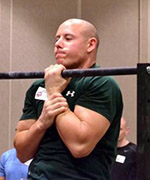 Matt Begansky owns and trains at The House of Fitness. His website is: www.TheHouseofFitness.com and he can be reached by phone at 301-520-5510 or email thehouseoffitnesspt@gmail.com.
Matt Begansky owns and trains at The House of Fitness. His website is: www.TheHouseofFitness.com and he can be reached by phone at 301-520-5510 or email thehouseoffitnesspt@gmail.com.
Back